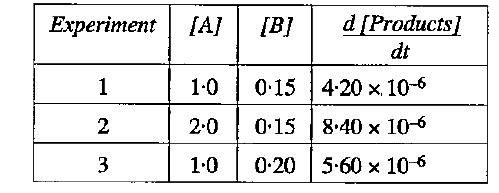Higher order (>3) reaction are rare due to :
low probability of simultaneous collision of all the reacting species
increase in entropy and activation energy as more molecules are involved
shifting of equilibrium towards reactants due to elastic collisions
loss of active species on collision
The correct Answer is:A
To solve the question regarding why higher order reactions (greater than 3) are rare, we can follow these steps:
Step 1: Understand the concept of reaction order
- Reaction order refers to the number of molecules or species that must collide simultaneously for a reaction to occur. Higher order reactions involve more than three reactant molecules colliding at the same time.
Step 2: Analyze the probability of simultaneous collisions
- For a reaction to occur, all the reactant molecules must collide with the correct orientation and sufficient energy. As the number of molecules involved increases, the likelihood of all of them colliding simultaneously decreases significantly.
Step 3: Evaluate the options given in the question
- The options provided are:
1. Low probability of simultaneous collision of all the reacting species
2. Increase in entropy and activation energy as more molecules are involved
3. Shifting of equilibrium towards reactants due to elastic collisions
4. Loss of active species on collision
Step 4: Identify the most relevant option
- Among the options, the first option, "low probability of simultaneous collision of all the reacting species," directly addresses the reason why higher order reactions are rare. The probability of more than three molecules colliding at the same time is extremely low, making such reactions uncommon.
Step 5: Conclusion
- Therefore, the correct answer to the question is that higher order reactions (greater than 3) are rare due to the low probability of simultaneous collisions of all the reacting species.
Final Answer:
Higher order (greater than 3) reactions are rare due to the low probability of simultaneous collisions of all the reacting species.
---
- Reaction order refers to the number of molecules or species that must collide simultaneously for a reaction to occur. Higher order reactions involve more than three reactant molecules colliding at the same time.
- For a reaction to occur, all the reactant molecules must collide with the correct orientation and sufficient energy. As the number of molecules involved increases, the likelihood of all of them colliding simultaneously decreases significantly.
- The options provided are:
1. Low probability of simultaneous collision of all the reacting species
2. Increase in entropy and activation energy as more molecules are involved
3. Shifting of equilibrium towards reactants due to elastic collisions
4. Loss of active species on collision
- Among the options, the first option, "low probability of simultaneous collision of all the reacting species," directly addresses the reason why higher order reactions are rare. The probability of more than three molecules colliding at the same time is extremely low, making such reactions uncommon.
- Therefore, the correct answer to the question is that higher order reactions (greater than 3) are rare due to the low probability of simultaneous collisions of all the reacting species.
Higher order (greater than 3) reactions are rare due to the low probability of simultaneous collisions of all the reacting species.
Topper's Solved these Questions
- CHEMICAL KINETICS BOOK - VMC MODULES ENGLISHCHAPTER - CHEMICAL KINETICS EXERCISE - JEE Advanced (Archive)
52 Videos
- CHEMICAL KINETICS BOOK - VMC MODULES ENGLISHCHAPTER - CHEMICAL KINETICS EXERCISE - Level-2 ( Numerical Value Type for JEE Main )
15 Videos
- CHEMICAL EQUILIBRIUMBOOK - VMC MODULES ENGLISHCHAPTER - CHEMICAL EQUILIBRIUMEXERCISE - IN-CHAPTER EXERCISE - G
10 Videos
- CHEMICAL THERMODYNAMICS BOOK - VMC MODULES ENGLISHCHAPTER - CHEMICAL THERMODYNAMICS EXERCISE - IN - CHAPTER EXERCISE - L
10 Videos
Similar Questions
In pickles infection is rare due to
View SolutionHalf life of a first order reaction and a zero order reaction are same. Then the ratio of the initial rate of the first order reaction to that of zero order reaction is
View SolutionAssertion : The overall order of the reaction is the sum of the exponents of all the reactants in the rate expression.
Reason: There are many higher order reactions.
View SolutionA study of chemical kinetics of the reaction A+B→ products, gave the following data at 25∘C:

Find : (1) The order of reaction with respect to A. (2) The order of reaction with respect to B. (3) The rate law.
View SolutionWhat would be the effect on the rate of reaction due to the four-fold increase in a reactant concentration, if the order of reaction were the following:
(a) Zero order , (b) First order
( c) 1/2 order , (d) Fourth order
View SolutionThe order of a reaction rarely exceeds ...........
View SolutionWhat is meant by molecularity of a reaction ? Why the molecularity of a reaction rarely exceeds three?
View SolutionThe set representing the correct order of ionic radius is
View SolutionThe set representing the correct order of ionic radius is : a)Na+>Mg2+>Al3+>Be2+>Li+ b)Na+>Li+>Mg2+>Al3+>Be2+ c)Na+>Mg2+>Al3+>Li+>Be2+ d)Na+>Mg2+>Li+>Be2+>Al3+
View SolutionSystolic pressure is higher than diastolic pressure due to :−
View Solution